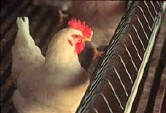
TUESDAY, Aug. 17 (HealthDay News) — Poultry litter can be a significant source of arsenic in the farm field runoff that finds its way into streams and rivers, new research indicates.
Arsenic is a poisonous chemical linked with cancer and other health problems in humans.
Chicken feed is sometimes supplemented with roxarsone, an arsenic-containing compound that’s meant to control parasites and promote weight gain. Most of the arsenic is excreted by the chickens and gets mixed in with sawdust and other litter materials in poultry houses. When this litter is cleaned from the poultry houses, farmers use it to fertilize their crops, explained the U.S. Department of Agriculture-Agricultural Research Service (ARS) scientists.
Over a two-year period, Clinton Church of the ARS Pasture Systems and Watershed Management Research Unit in University Park, Pa., and colleagues measured arsenic levels in runoff flowing from farm fields into drainage ditches in an area that features large-scale poultry production, in the Delmarva (Delaware, Maryland, Virginia) Peninsula.
The researchers found that annual arsenic losses from these fields ranged from 0.004 to 0.071 kilograms per hectare. The highest levels of arsenic in runoff was recorded in a ditch closest to a shed where poultry litter was stored.
The findings will be published in the November/December issue of the Journal of Environmental Quality.
The scientists said their research emphasizes the importance of controlling point sources of arsenic. Improved management practices, such as properly storing dry litter and controlling litter spills outside storage facilities, may help reduce the release of arsenic into streams and rivers, they suggest.
More information
The U.S. Agency for Toxic Substances and Disease Registry has more about arsenic.

